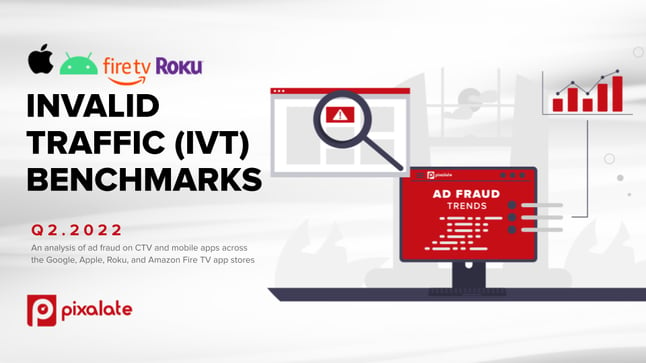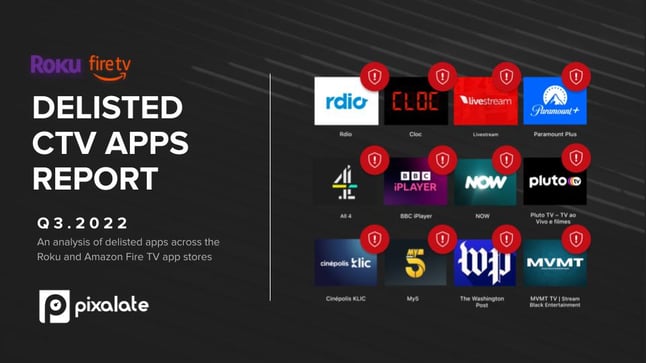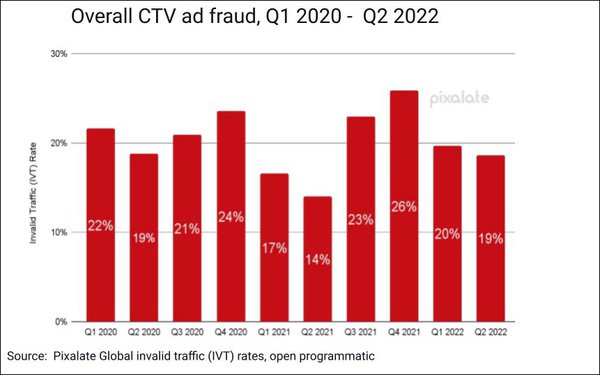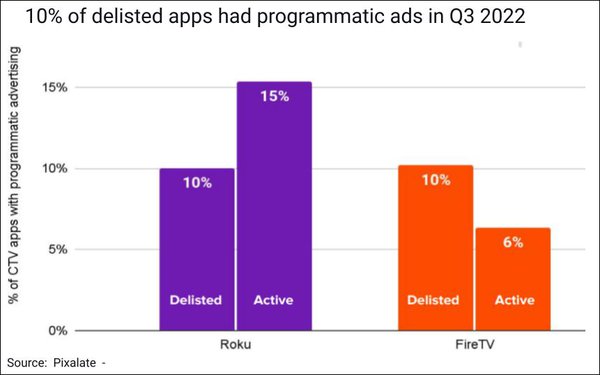
This week's review of ad fraud and privacy in the digital advertising space:

Pixalate released the Q2 2022 Invalid Traffic Benchmarks Report, a comprehensive examination of the global state of ad fraud in the first half of 2022 in the top two CTV (Roku, Amazon Fire TV) and mobile (Apple, Google) app stores.
The research study revealed 2x more ad fraud in Q2 2022 on Roku apps without app-ads.txt vs. with app-ads.txt; IVT rates were 16% on Roku devices and 17% on Amazon Fire TV devices.

Pixalate released the Q3 2022 Delisted CTV Apps Report, containing insights about CTV apps removed from the Roku and Amazon apps stores. The analysis helps developers and advertisers recognize potential threats of privacy and compliance breaches.
Pixalate analyzed more than 45k CTV apps across the Roku and Amazon Fire TV app stores, and found that nearly 1.6k were delisted in Q3 2022 — an increase of 452% compared to the 339 delisted in Q2 2022. Amazon Fire TV delisted 49 apps, a 14% increase since last quarter. These delisted apps comprise 4% of all active CTV apps across both stores.

MediaPost cited Pixalate's new research on global invalid traffic trends for Q2 2022. The article states:
"The average overall global ad-fraud rate in open programmatic buys was 19% in this year’s second quarter, according to Pixalate’s latest invalid traffic (IVT) global benchmarks analysis.
That was actually lower than all but four of the quarters since Q1 2020, although up compared to last year’s second (14%) and first (17%) quarters."

MediaPost summarized Pixalate's analysis and findings surrounding the delisting of CTV apps. The research showed a big jump in delisted apps (1,600) across the Roku store.
"The number of connected TV (CTV) apps delisted across the Roku and Fire TV app stores increased by 452% in this year’s third quarter, as compared to the same quarter in 2021, according to the latest analysis by Pixalate."

The New York Times detailed a new legal complaint the U.S. Federal Trade Commission (FTC) filed against education tech company Chegg for exposing the data of 40 million users.
*By entering your email address and clicking Subscribe, you are agreeing to our Terms of Use and Privacy Policy.
These Stories on Weekly Recaps
*By entering your email address and clicking Subscribe, you are agreeing to our Terms of Use and Privacy Policy.

Disclaimer: The content of this page reflects Pixalate’s opinions with respect to the factors that Pixalate believes can be useful to the digital media industry. Any proprietary data shared is grounded in Pixalate’s proprietary technology and analytics, which Pixalate is continuously evaluating and updating. Any references to outside sources should not be construed as endorsements. Pixalate’s opinions are just that - opinion, not facts or guarantees.
Per the MRC, “'Fraud' is not intended to represent fraud as defined in various laws, statutes and ordinances or as conventionally used in U.S. Court or other legal proceedings, but rather a custom definition strictly for advertising measurement purposes. Also per the MRC, “‘Invalid Traffic’ is defined generally as traffic that does not meet certain ad serving quality or completeness criteria, or otherwise does not represent legitimate ad traffic that should be included in measurement counts. Among the reasons why ad traffic may be deemed invalid is it is a result of non-human traffic (spiders, bots, etc.), or activity designed to produce fraudulent traffic.”

